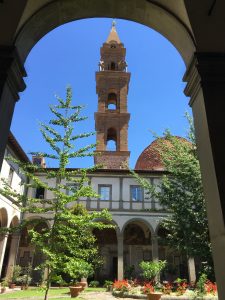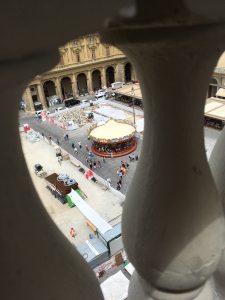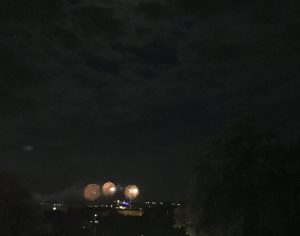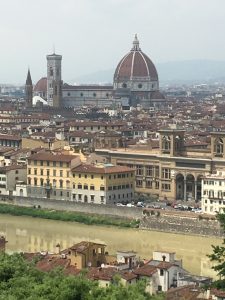The Fourth of July looks a little different to me this year. That’s because it’s only been a few days since my husband and I returned from eight weeks in Florence, Italy, and I’m still keenly sensitive to the differences of life in the suburbs of Southern California versus life in the birthplace of the Renaissance.
Living in a foreign environment for more than a few vacation days can open your eyes to the pleasures and problems of both temporary locale and permanent home. As this was our second extended stay in Florence—we spent eight months there a little more than two decades ago—we had some familiarity with the culture and the language going into our summer sojourn. Given this unique opportunity to go beyond the typical tourist trail, we took steps to maximize our time and knowledge, diving into Italian history and culture whenever we could.
We returned home with a deeper appreciation for many things Italian—like art, amazingly fresh food, and tiny neighborhood shops—and many things American—like wide streets, drive-thru burgers, and convenient supermarkets. And on this day when my country pauses to celebrate the myriad bits of history and geography and people that contribute to the beautiful mosaic of America in its 242nd year, I find myself deeply appreciative of immigrants.
A Glimmer of Understanding
Eight weeks in a foreign culture gave me just a glimmer of the reality of life for anyone in an alien land—where language is a struggle, where ignorance of the unwritten rules can lead to humiliating mistakes, where every interaction provides multiple opportunities for misunderstanding.
Our eight weeks were spent in the best of both worlds: living in housing provided by Pepperdine University with dozens of English-speaking students and enough Italian staff around to translate and educate and help us navigate rough patches. On top of that, much of our time was spent in tourist-heavy districts where most everyone speaks a surprising amount of English.
Even so, my lack of fluency in Italian proved challenging in so many situations. Pocket dictionaries and Google Translate are simply inadequate when you’re trying to choose from a row of similarly shaped plastic bottles all clearly meant for use in the lavatrice (washing machine) but all with slight vocabulary differences on the labels. Is this a bottle of detergent or bleach? Or maybe it’s fabric softener?
I had little trouble communicating with the English-speaking doctor who prescribed a new type of inhaler for my persistent cough. But I needed assistance from the Italian-speaking office staff to learn how to use the unfamiliar inhaler.
We quickly learned to understand most menus, but traffic warning signs and daily headlines remained a mystery. Finding the right bus stop typically is as simple as locating your route number on a sign—but you may stand at the wrong stop for a long time if you can’t decipher the handwritten note about that day’s alternate route. And few bus stop signs explain—in any language—how you need to buy your tickets before boarding and validate them as soon as you get on. We watched bus security employees harshly reprimand—and ultimately remove—a Korean family of four who failed to grasp the system.
 Unseen Hazards
Unseen Hazards
Even more challenging than the language barriers are the unwritten rules and common knowledge so apparent to natives and so invisible to outsiders. One Saturday we headed to nearby shops as we prepared to welcome guests—only to find the shops closed for a national holiday, a holiday we had been completely oblivious to.
More than once, I elicited snickers or downright scorn for ordering the wrong combination of food and drinks or for standing in the wrong line or choosing the wrong entrance or exit. Customers behind you in the grocery store line will have little patience if you fail to have all your groceries bagged and out of the way by the time the checker totals your bill. Often I felt like I was looking through a keyhole, comprehending only a fraction of what was going on around me.
Experiences like these made me consider the generations of people who have come to the U.S. from all over the world for the past 500 years. On the Fourth of July, it’s easy to remember the Founding Fathers and the Declaration of Independence and the Minutemen and the Revolutionary War heroes who fought military and political battles to establish a new and different kind of country. But on this Fourth of July, I’m thinking about all the unsung people who left everything that was familiar and fought language and cultural battles to establish a new and different kind of life for themselves and their families.
Sacrifices and Success
I would never pretend that my couple of months of minor lifestyle inconveniences compare with the dangers and heartbreaks faced by many immigrants, but they have given me insight into the daily struggles of life in a place where you don’t understand the language or the unwritten rules.
And I would never pretend that I have all the answers about how to best repair my country’s troubled and troubling  immigration system, but the most recent controversies and horror stories have only increased my respect and admiration for the immigrants who survive—and thrive—in spite of unimaginable difficulties.
immigration system, but the most recent controversies and horror stories have only increased my respect and admiration for the immigrants who survive—and thrive—in spite of unimaginable difficulties.
So today, I celebrate my country—and the immigrants who have helped make her great. I celebrate their resilience, their determination and grit, their will to succeed in the face of great odds. I celebrate their contributions of knowledge and food and music and art that have enriched my country and my life in ways I will never fully know.
May God bless America. And may God bless the immigrants who bless America.



Welll said, Tammy. I must say that that this 4th I felt a little glimmer of hope within all the turmoil. It was a good, positive day for us all.
Thank you, Susan! Glimmers of hope are definitely needed. Glad you enjoyed this post!